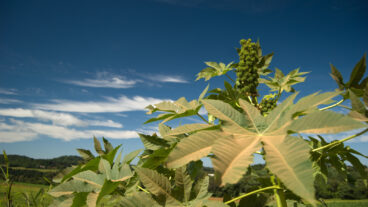Health-conscious Israelis enjoy an organic drink at Kibbutz Alummot, one of the many ‘natural’ resorts that have opened in the country.
“Not only are plants becoming polluted but people’s bodies are also being harmed by the accumulated waste. It is our duty to ensure both the cleanliness of nature and the health of man and to initiate activities in all domains in the country, in the region and in the world to harness them on time.”
Those words spoken recently by Israeli octogenarian President Shimon Peres prompted an opinion piece in the daily Ha’aretz newspaper called A Graying Peres Goes Green by Professor Dan Rabinowitz, chairperson of Life and Environment, Israel’s umbrella environment organization.
“When Shimon Peres starts taking an interest in environmental quality, this is another sign that the issue has finally been pried from the hobby niche and is… a basic element in the struggle for survival on this planet,” wrote Rabinowitz, adding that “the personal transformation that he is undergoing is interesting, as it represents an important process happening recently to many people in the world and, of late, in Israel, too.”
Has Israel joined the green revolution? Besides the high profile statement from Peres, not a day goes by without some item in the media stressing the positive steps that Israelis are taking (or avoiding) to buy organic produce, go vegetarian, opt for public transportation, waste less, consume less, espouse animal rights, boycott smoke-filled restaurants and generally to consider the environment. The tip of Israel’s green-society iceberg is showing, and looming larger and larger with each passing week.
Case in point is The Israeli Guide to Organic Food (in Hebrew) by journalists Aviv Lavie and Shiri Katz. Published less than six months ago, it is already in its fifth printing and according to Lavie, “is selling like hot cakes”.
“Israelis are panting for information on organic food, and this is reflected by increases in turnover at organic outlets of between 20 to 30% a year,” he told ISRAEL21c.
On another environmental front, activist Amir Siman Tov has been waging his own private war against restaurants that refuse to observe Israel’s no-smoking-in-restaurants laws. He set up an organization called Linshom (to breathe, in Hebrew) and a website that has already attracted 18,000 supporters.
“Over the past few months about 50 lawsuits have been instituted, mostly in small-claims courts”, he told ISRAEL21c. “I was recently awarded NIS 3,100 ($800) by a judge who agreed entirely with my complaint against a smoky Tel Aviv bar-restaurant. The money is not important; the more the restaurant owners feel the pinch at the cash register, the more they’ll abide by the laws.”
According to Siman Tov, while only about 25% of adult Israelis smoke, most non-smoking Israelis “are too meek to demand their rights – or feel it isn’t worth the fuss.”
However, the activists at Linshom are proud that partly through their efforts, Israel’s no-smoking laws were extended and enhanced this month, specifically to include bars, discos and other ‘non-food’ enterprises.
Other Israelis are also helping to make a difference in the way their fellow citizens are informed about protecting their surroundings. American immigrant Joanna Katzen recently established a website forum for English-speaking Israelis concerned about the environment, interested in organic foods and similar issues. (A parallel site for Hebrew-speakers has been around for a while.)
“The response has been amazing,” she told ISRAEL21c. “Over 100 people joined within less than 48 hours. The forum is apolitical, I hope the exchange of ideas, and thoughts will promote organic farming, responsible consumerism, spirituality and holistic thought. If we can bring about a change in the way people treat the earth; if we can expose more people to this lifestyle, who knows how this ripple effect can affect our lives, hopefully even the prospect of peace in the Middle East”.
There is no lack of enterprising Israelis offering a huge range of “alternative” treatments, including massage, weight-loss, exercise and therapy, fasting and more. Husband and wife team Zvi and Pnina Koren regularly run laid-back juice-fast weekends that incorporate many aspects of these in a casual, non-competitive setting.
“The purpose is to clear the mind, detoxify the body and allow the body’s organs to rest and recuperate. A side benefit is of course the possibility of turning over a new page in the ‘we start dieting tomorrow’ book,” Zvi said. The program includes organic juice, yoga, meditation, walks, lectures and even music. Non-medical massages are also available.
Similar, but more formal, juice fasts for varying periods are also available at some upscale resorts around the country, including Kibbutz Alummot, the Carmel Forest Spa, and Tree of Life.
Whether it be the tasty organic wines some Israeli wineries are producing, an organic hummus joint in Tel Aviv, or the huge organic supermarket that recently opened in Netanya, it’s clear that the call by Shimon Peres for a rethinking of how to protect Israel’s natural resources and to invoke healthy habits for its citizens is beginning to take hold. Hopefully, the efforts by Siman Tov, Katzen and other pioneers in Israel’s ‘green’ revolution will one day become the mainstream for Israeli society.![]()












